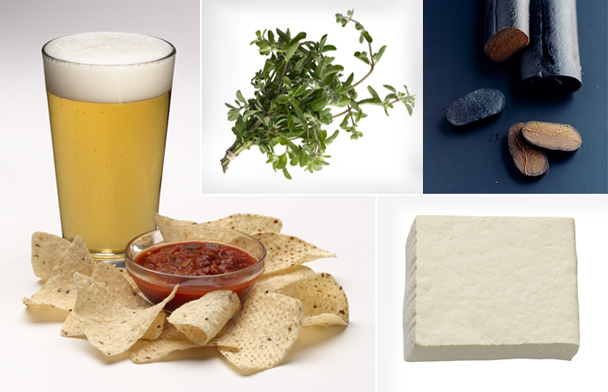The word aphrodisiac, which is derived from Aphrodite, the Greek goddess of love, beauty, and fertility, might conjure up cheesy, soft-focus images of couples feeding each other glistening oysters or chocolate truffles. But aphrodisiacs are as ancient as Aphrodite herself, and every culture since the Greeks seems to swear by at least a few (hello, pomegranates, shark’s fin—and green M&M’s). Yet what can be said of their unsexy opposites, anti-aphrodisiacs or anaphrodisiacs? For a short course on the edible enemies of all things amorous, I turned to contemporary experts, including Amy Reiley, a master of gastronomy diplomate of the Cordon Bleu, publisher of the monthly Eat Something Sexy newsletter, and author of four books on aphrodisiacs, including the new Romancing the Stove: The Unabridged Guide to Aphrodisiac Foods.
According to Reiley, the relationship between foods and sex drive (whether boosting or busting) has not been widely investigated by the medical community, at least not directly. “Most of the modern, scientific discoveries are by-products of studies on some other effect of a nutrient,” she explains. Yet many nutrition and sex experts do see a holistic connection between what you eat and the body’s sexual response (or lack thereof).
Reiley, who often consults with chefs to plan romantic meals, notes that some ingredients, like caffeine, may stimulate certain brain areas and trigger sexual feelings when you’re with the right person. And foods with easily digestible zinc, such as oysters, shrimp, and pumpkin seeds, can improve blood flow throughout the body, which helps get you both physically and mentally ready for intercourse. Then there are spicy choices like chile peppers, which cause skin to flush, heart rate to increase, and body temperature to rise, mimicking the early stages of arousal. (They also cause lips to plump up “so they’re more kissable,” says Reiley.) Finally, certain vitamins and minerals, specifically selenium for men (found in eggs, Brazil nuts, and brown rice) and vitamin E for both men and women (from spinach, almonds, and papaya) are believed to help boost and balance sexual-hormone levels, increasing both desire and stamina.
If aphrodisiacs raise sexual-hormone levels and make you feel more alert, then anti-aphrodisiacs do the opposite, either by robbing the body of the energy required to close the deal or decreasing levels of crucial hormones like testosterone. Although anti-aphrodisiacs don’t get much media coverage, many people have specific ideas about how to define one. An informal survey of turnoff foods elicited responses such as gas-inducing beans, hot dogs (deemed “so suggestive they’re gross”), rich and potentially unappetizing dishes like organ meats, “big sandwiches you have to stuff into your mouth,” and soporific meals, like “an epically long tasting menu with wine pairings.”
But what foods really run the risk of turning down the body heat? For starters, would-be wooers are advised to watch their carbohydrate intake. If your favorite date spot is your local trattoria, avoid large portions of pasta, which sex educator and therapist Laura Berman, PhD, author of Loving Sex: The Book of Joy and Passion and host of In the Bedroom with Dr. Laura Berman and The Dr. Laura Berman Show, says will negatively affect metabolism. “A big plate of fettuccine will send your body into carb overload, causing an insulin spike, which will make you feel bloated, tired, and definitely not in the mood for sex.” To best achieve your evening’s goal, Berman recommends filling your plates with hot and spicy vegetables and lean protein instead.
For some couples, a steak for two might be the ultimate splurge, but doctors and nutrition experts caution that as with pasta, excessive amounts of fat and protein aren’t going to encourage after-dinner passion, either. Reiley says that when she’s working with a chef to plan a Valentine’s Day menu, she counsels steering clear of fatty red meats such as lamb shank, Kobe beef, or rib eye. “It’s quite logical: What do you want to do after eating a big steak? Take a big nap,” she says. Because these cuts contain so much fat and protein, your body has to work hard to digest them, which leads to that sleepy feeling. “The last thing you want in a romantic situation is to have all of your energy going toward breaking down your dinner,” Reiley warns.



 Pinterest
Pinterest


